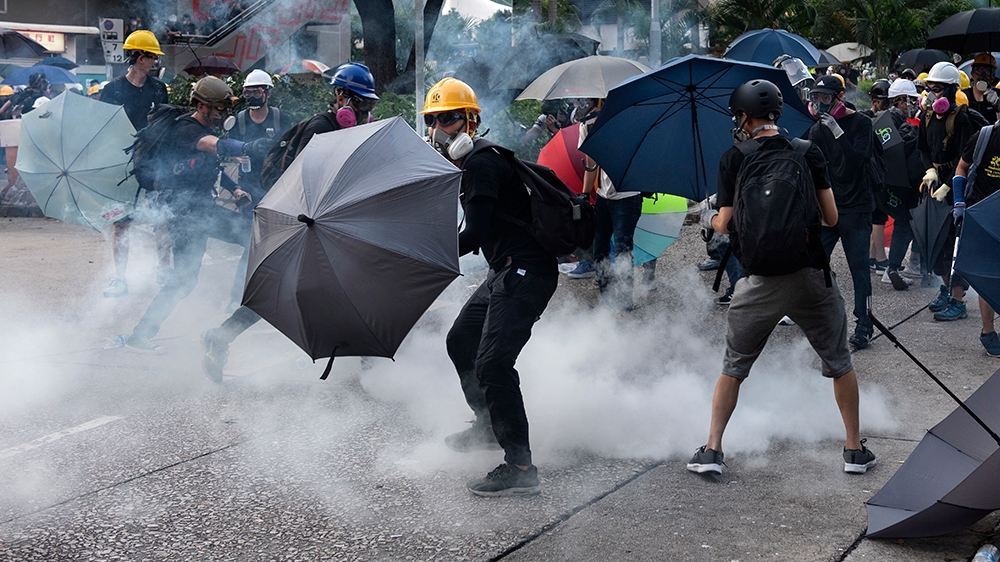Citywide strike paralyses Hong Kong, descends into chaos
Peaceful strike turns into teargas-filled mayhem as police try to chase down quickly shifting demonstrations.

Hong Kong – Annual or sick leave, working remotely and plain old hooky – these were some of the many excuses Hong Kong employees gave their bosses on Monday as thousands of people staged a general strike against the government’s handling of a major political crisis in the semi-autonomous Chinese territory.
But what began as peaceful paralysis quickly descended into gridlock and mayhem over broad swaths of the Asian financial hub.
Keep reading
list of 4 itemsHong Kong’s new security law comes into force amid human rights concerns
Hong Kong passes tough new national security law
What is Article 23, Hong Kong’s new draconian national security law?
Riot police fired several rounds of tear gas at protesters as they tried to contain quickly shifting demonstrations in different parts of the city. Police said they arrested 82 people.
Starting early in the morning, protesters disrupted train stations, blocked roads and tunnels, and halted more than 200 flights. As the city’s renowned transportation network froze, thousands of businesses remained shut.
By early afternoon, at least seven rallies unfolded in different neighbourhoods, with protesters calling on the Beijing-backed government to address the demands of an unyielding democratic movement.
Extradition bill
Mass demonstrations began in early June over a now-shelved extradition bill that would have allowed suspects in Hong Kong to be sent to mainland China for trial. Protests have transformed into a broader movement against alleged mainland interference and deteriorating freedoms, with protesters’ demands including an independent inquiry into alleged police brutality, the release of arrested demonstrators and the direct election of officials.
|
|
Hong Kong has enjoyed a special status as a semi-autonomous region of China since the former British colony returned to Beijing in 1997.
A framework known as “one country, two systems” was set up to protect the city’s independent judiciary and civil liberties, unseen on the mainland.
Over the past nine weeks, the afternoon rallies around the city devolved into a confusing melee of clashes, standoffs, occupations and tear gas clouds.
Protesters on Monday besieged police stations, and in one case set fire outside one in northern Hong Kong that was extinguished by firefighters.
In Yuen Long, the scene of a vicious mob attack in a train station that left 45 people wounded last month, video footage showed a car breaking through a barricade built by protesters.
Footage showed men in white shirts wielding sticks and attacking protesters on Hong Kong island’s North Point district, in an incident bearing similarities to the train station attack.
At one rally outside government headquarters in Admiralty, thousands of black-clad protesters funnelled into a main thoroughfare and brought traffic to a standstill in the central business district.
Protesters shouted “Gangs! Gangs!” at police as they fired several rounds of tear gas at crowds, prompting a wave of arms signalling for people to move back.
“After repeated and futile warnings, in face of the situation, anti-riot police officers have deployed tear gas and minimum force to disperse protesters,” police said, appealing “to everyone in the area to leave immediately”.

‘Dangerous situation’
Protesters’ anger intensified on Monday morning after the city’s embattled leader Carrie Lam made her first public appearance in two weeks and blamed “this series of extremely violent acts” for “pushing Hong Kong to a very dangerous situation”.
Lam made no concessions and warned anti-government protesters were dragging Hong Kong down a “path of no return”.
“Rubbish,” commented Cherry, a 40-year-old nurse at the Admiralty protest, referring to the chief executive’s statement. “[The crisis] is getting worse and worse because the government is not answering our demands … I think she makes more people come today.”
|
|
Cherry, who only gave her first name for fear of being targeted, went on strike on Monday with her boss’s support.
“My employer is overseas, and they said they don’t want China to control Hong Kong either. He also said when he comes over to Hong Kong, he wants a better Hong Kong, so he supports me.”
Employer retribution was one of the biggest concerns among strike participants.
Ahead of a Friday evening rally where civil servants gathered to denounce their employer, the government warned them that they must serve it with “total loyalty” or else “seriously follow up on any violations of regulations by civil servants”.
“I’m not [a] front liner, I’m just here to support the protesters,” said Kwong, 29, a manager at a Hong Kong-based investment bank.
“They should have their own critical thinking. If they think it’s the correct thing to do, just do it. Not saying I encourage violence, but the government should listen to what the people demand, and the people should voice out their opinions to the government.”
“The morale has been affected,” Kwong added, referring to how the protests have influenced the workplace. “Nobody is willing to work, they just pay attention to the news.”
Police said on Monday that since the mass demonstrations began on June 9, 420 people had been arrested in connection to political unrest.